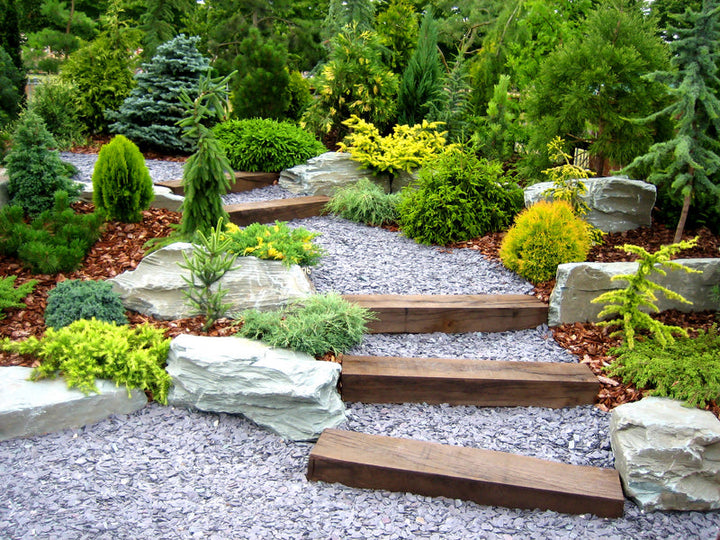Choosing the Best Gravel For Your Driveway

Choosing the best gravel for your driveway is an important decision and will help you create the result you want - both visually and practically. There are a few distinct factors to consider including gravel type, size, colour & maintenance.
As specialists in decorative aggregates, we are here to help guide you and provide all the advice you need for your driveway project from start to finish.
In this post, we will cover the advantages of gravel driveways and consider the best gravel types and colour options as well as answer the questions we most frequently get asked by our many customers.
Benefits of a Gravel Driveway
There are several benefits to choosing gravel for your driveway project compared to other traditional options such as concrete or asphalt. These include:
-
Design Versatility – There are many gravel colours, shapes, and sizes to choose from, allowing you to be creative and design the driveway to complement your home and personality.
- Low Maintenance – Gravel driveways help suppress weeds and do not require mowing, trimming, or watering.
- Affordable – Compared to other driveway solutions such as tarmac, paving or turf, gravel is cheaper and easier to install and maintain.
- Drainage – Gravel provides excellent rainwater drainage, leaving your new driveway puddle free.
- Security – As a loose aggregate, gravel produces a distinct crunch sound when walked on, alerting you when someone is outside.
- Simple to lay – Unlike other driveway surfaces which may require hiring a contractor or professional landscaper, a gravel driveway is an undertaking any novice DIYer can succeed at.
What to consider when choosing the best gravel for your driveway
Best Type of Gravel
It is important to consider how the driveway at your property will be used. If there are going to be vehicles coming on and off the driveway, then we highly recommend selecting an angular aggregate between the sizes of 14mm-20mm. Gravel at this size range will knit together and form a compact surface.
Try to avoid smaller sized gravels at around 10mm or less as they will get stuck in the tyre treads. Similarly, gravels larger than 20mm or stones that are more rounded, such as pebbles, are not recommended for driveway projects as they will move and shift.
Popular choices at the 14mm-20mm range include the Cotswold Buff Chippings, Cotswold Gold Gravel or the Dove Grey Limestone.
An alternative to angular gravel, slate is becoming a more common and popular choice for driveways. However, slate is more brittle than other gravel stones so you need to consider what type of traffic your driveway will have and how heavy it will be.

Best Gravel Colour Options
Thinking about how the gravel you choose will complement the style of your home and its surroundings is another important consideration. Fortunately, there are a vast amount of gravel choices for all types of home design from contemporary to traditional.
Golden & cream-coloured aggregates like, Golden Gravel, look stunning and make an impressive contrast against darker brickwork – this is a classic choice for gravel driveways.
For an even lighter, brighter touch, our popular 20mm Polar White Marble is the ideal choice for a modern design, and it highlights plants and trees beautifully. However, It is worth stating the obvious - Polar white gravel is white so this a higher maintenance option and you will probably need to remove any staining caused by car tyres on a regular basis to keep it looking fabulous!
Alternatively, the Green Granite Gravel 20mm is an elegant, eye-catching gravel that blends in subtly with grey and beige brickwork and works perfectly for gravel driveways in both urban and residential settings.
Grey & charcoal gravel driveways are also a highly popular choice, and our lovely Charcoal Granite is a particular favourite and right on trend at the moment.
Laying & Maintaining a gravel driveway
Once you have chosen the type and colour of gravel you want for your new driveway, the next steps to keep in mind are:
-
Laying down the aggregates and what is involved in the process.
- Making sure you maintain your beautiful new driveway and keep it looking amazing after it is complete.
This section is worthy of its own blog piece and if you would like to know more click through to How to Lay and Maintain a Gravel Driveway in 7 Steps.
FAQs about gravel driveways
How much gravel will I need for my driveway?
This will depend on the size and dimensions of your driveway at your home; however, we can help! Head over to gravel calculator.
Can I lay a gravel driveway myself?
Yes, regardless of experience in landscaping, laying down a gravel driveway is simple when following the right steps. The article mentioned above goes through each one for you.
How can I avoid dust appearing on my gravel driveway?
Make sure to apply water to your gravel driveway at least once or twice a week. You can do this by spraying water over the driveway with a garden hose or a sprinkler system if available.
How long will a gravel driveway last?
Gravel driveways are incredibly durable, but they are even more so when well maintained. Caring for your driveway will help it last decades. Adding new gravel every two to five years and moving gravel from the sides to the centre at least once a year will help your new gravel drive last.
Is planning permission required for a gravel driveway installation?
Gravel is a permeable or porous material allowing water to drain through, this means that you will not need planning permission to lay down your new gravel driveway.



